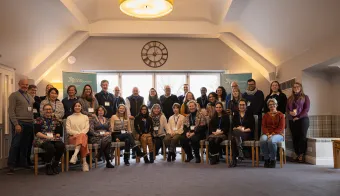
- Alliances between science, industry, society and policy are essential to reduce the scourge of plastic pollution
- Experts are calling on the United Nation’s Environment Programme to demonstrate leadership and collaboration between these communities
- Read the full comment in Nature Communications
Progress to reduce plastic pollution has been painfully slow and the consequent damage to the natural environment and to human health is likely to increase further. This has been because the views and ways of working of four distinct stakeholder communities are not sufficiently well integrated.
In a comment piece published in Nature, experts mainly from across the UK have called for the United Nation’s Environment Programme (UNEP) to better address collaboration to reduce the scourge of plastic pollution.
All corners of the community (1) Scientists, (2) industry, (3) society at large and (4) those making policy and legislation must in future find ways to work together.
None of these communities alone have all the expertise needed to address this serious and urgent issue but all have a crucial role in finding a solution. By engaging with the proposed interdisciplinary stakeholders new paths and incentives will become extremely obvious and compelling.
Addressing the UNEP ahead of a critical meeting later this month, the authors said, “We therefore call on the international community and UNEP in particular to demonstrate leadership courage and integrity to work collaboratively to create the new paradigms required to end the pollution of our environment and safeguard the health of our planet.”
The UNEP’s second session of the Intergovernmental Negotiating Committee to develop an international legally binding instrument on plastic pollution, including in the marine environment (INC-2) will take place from 29 May to 2 June 2023 at the United Nations Educational, Scientific and Cultural Organization (UNESCO) Headquarters in Paris, France.
Learn more about our plastic research and educational resources
The comment piece was a direct outcome of a collaborative workshop on Socio-Oceanography in March 2023, led by the National Oceanography Centre, funded by the UK Natural Environment Research Council project SOLSTICE (NE/P021050/1). This work supports our values of working in partnership and integrity.